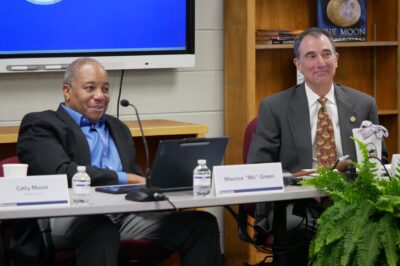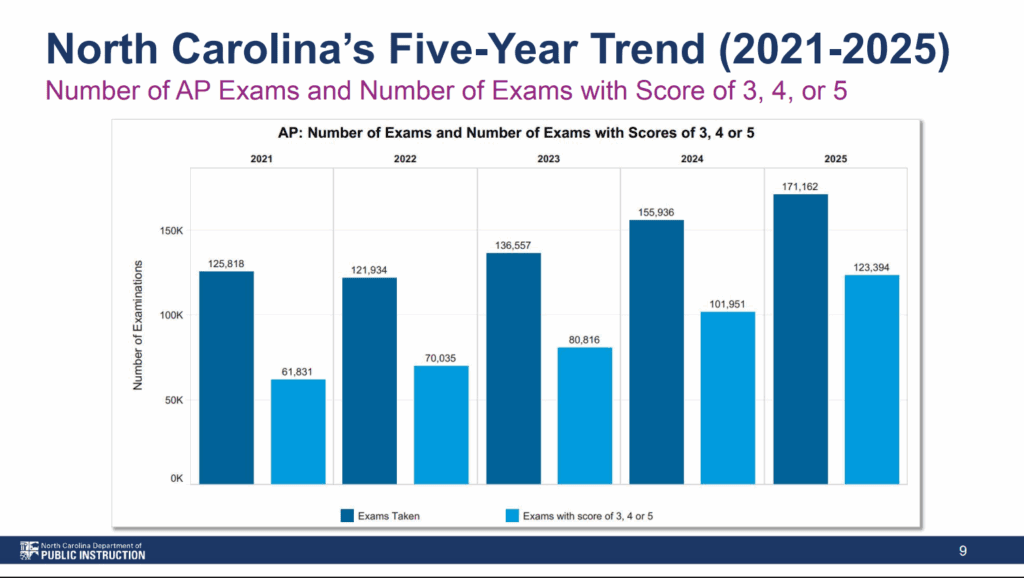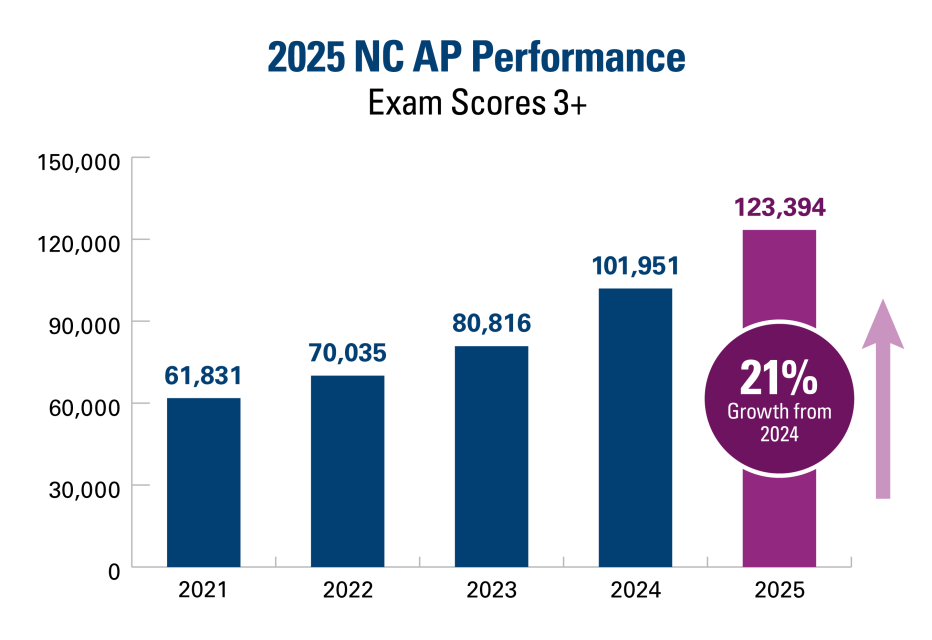
North Carolina students’ participation and success in Advanced Placement (AP) exams reached their highest level during the 2024-25 school year, according to data presented at the State Board of Education’s biannual planning and work session on Wednesday.
“North Carolina public school students are making history,” said Superintendent Maurice “Mo” Green at a Wednesday press conference. “For the fourth year in a row, the participation and passing scores for Advanced Placement exams have increased. And this year’s metrics are the highest they have ever been.”
![]() Sign up for the EdDaily to start each weekday with the top education news.
Sign up for the EdDaily to start each weekday with the top education news.
The College Board’s AP program allows students to take college-level courses in high school. In most cases, if students score a qualifying score of 3, 4, or 5 on an AP course exam, they can earn credit for the corresponding course at their college or university.
More than 90,500 students took AP exams in the last school year, a 7.3% increase from 2024. That contributed to a 9.8% increase in tests taken, which reached 171,162.
Students also performed better on these exams than ever before, according to the Department of Public Instruction (DPI). The number of exams with qualifying scores of 3 or higher increased by 21% to reach a success rate of 72.1%. That means North Carolina students surpassed the national success rate of 70.1%.
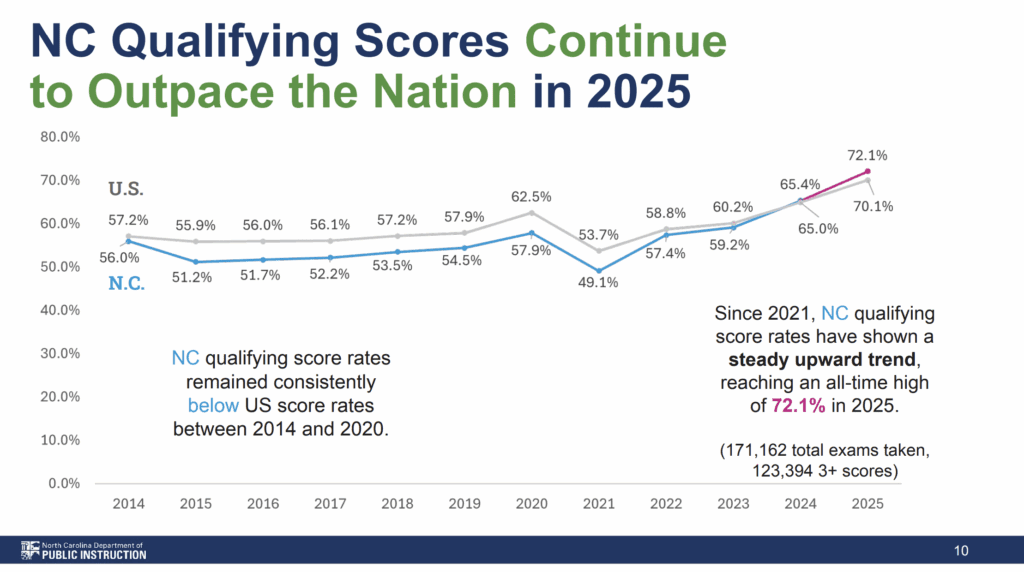
“Why is this so important? Why do we often talk about this metric? Because this means that a student in North Carolina scoring a 3 on an exam, a 4 on an exam, a 5 on an exam are just as prepared for postsecondary work as someone in New Jersey, Montana, Nebraska, Texas, California — around the world,” said Beth Cross, assistant director for Advanced Learning and Gifted Education at DPI.
Across every region of the state, the number of tests taken and tests with passing scores went up. The Southeast’s AP test-taking growth rate was the highest at 10.8%, while the Northeast saw the highest growth rate in performance at 28.0%.
These metrics also increased for every ethnic group in the state, according to DPI data. Black students’ qualifying scores went up by 33.5%, Latino students’ went up 26%, and American Indian students’ went up by 49.7%.
“It’s a clear reflection that when students are given the opportunity, they rise,” said Sneha Shah-Coltrane, senior director for Advanced Learning and Gifted Education at DPI.
The state has made an effort to raise these metrics since 2015, when lawmakers established the NC AP Partnership. According to a DPI press release, the partnership created a four-person team that gives districts targeted support, especially low-performing ones, and professional development.
The 2015 legislation also provided state funds to cover all AP exam fees for students, as well as International Baccalaureate (IB) and Cambridge International Education (CIE) fees and exams. Those costs totaled more than $17.6 million for the 2024-25 school year.
“Historically, the cost of the AP exam has been one of the barriers to entry for students interested in pursuing college credit while still in high school,” said Shah-Coltrane in the press release. “Eliminating that concern has opened the door for thousands more students from all different backgrounds to reach their full potential.”
District leaders joined Green for Wednesday’s press conference to share their own work expanding access and success in these exams.
Alamance-Burlington Schools, for example, eliminated its honors precalculus course to direct students towards its new AP counterpart.
“This has successfully given students who hadn’t previously taken an AP course a chance to experience and succeed in a rigorous academic environment,” said the district’s superintendent, Dr. Aaron Fleming.
Charlotte Mecklenburg Schools Deputy Superintendent Dr. Melissa Balknight attributed her district’s record results in AP exams to a summer training for teachers closely aligned to College Board standards, among other tactics.
The district’s 49,000 potential college credits earned through AP courses translate to $14.3 million in potential tuition savings for the district’s families, Balknight said.
Read more
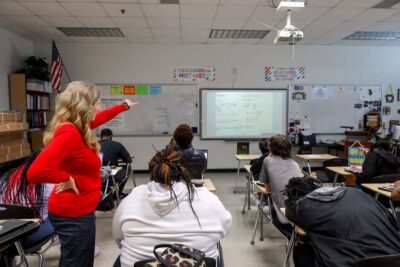
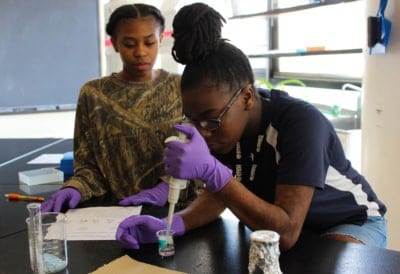

Strategic plan updates
The announcement came on the second day of the Board’s planning and work Session. The two-day summit featured presentations from DPI teams implementing the state’s new strategic plan for public schools, which launched in August.
The plan aims to make North Carolina public schools the “best in the nation” by 2030, relying on a series of wide-ranging initiatives.
These initiatives include a $25 million investment from the Golden LEAF Foundation into mathematics instruction in rural middle schools. Rachel Wright-Junio, director of the Golden LEAF Schools Initiative, said that a cohort of 10 low-performing schools began implementing the initiative’s new math curriculum this fall.
Another initiative in the plan is NC College Connect, a program that offers direct admission to certain postsecondary institutions. DPI said of over 70,000 students eligible for direct admissions, over 25,000 offers have already been accepted.
The plan also seeks to expand the state’s Advanced Teaching Roles (ATR) program, which allows highly effective teachers to receive salary supplements for teaching additional students or supporting other teachers. Geoff Coltrane, senior director of DPI’s Office of Government Affairs, said the Board approved three districts’ applications to begin implementing the program in October.
Nearly a third of the state’s districts now implement the program. But Coltrane said there aren’t enough resources to help more districts join. He said DPI is pursuing policy tweaks and advocating for funding increases to “get as many districts, if not all, participating in the program.”
On Wednesday, the summit’s attendees heard a presentation from Dr. Kristi Day, director of DPI’s Office of Teaching and Learning, on the department’s work to get high-quality instructional materials into every classroom.
“Across North Carolina, materials vary greatly. If you think about districts you’ve seen, that you’ve been in, teachers that you’ve talked to, everyone has a little bit of a different curriculum,” Day said. “That’s fine — there’s different contexts across the state. But what we want to make sure is that there’s a strong foundation that everyone has, that they can build upon for their local context.”
DPI’s Section Chief for Math, Science, and STEM, Dr. Charles Aiken, also gave a presentation recommending new math standards for public school students.
The department’s data review committee recommended requiring Math 1 and Math 2 for every student, and then allowing students to choose two upper-level math courses aligned to their postsecondary interests. The current Math 3 and Math 4 would be restructured into two new courses — Applied Statistics and Data Science and Mathematical & Statistical Modeling — with an updated Discrete Math course renamed Applied Logic and Reasoning.
Day also presented the recommendations to the Board at its regular monthly meeting on Thursday. She said her office will release a draft of the standards alongside a feedback survey on Friday, and that the Board will be able to vote on a final draft of the standards next summer.
Other meeting items
- The Board heard findings from a survey of the state’s 97 districts with low-performing schools. More than 80% of these districts’ superintendents decided to retain the principals in their low-performing schools, though 30% were retained with a remediation plan.
- The Advanced Teacher Roles program’s three new grantees — Alamance-Burlington School System, Hyde County Schools, and Mooresville Graded School District — will receive around 83% of their requested funding for the program’s implementation. The move highlights DPI’s ongoing concerns with its ability to fund the program’s expansion.
- The newly formed Task Force on Accountability confirmed its membership, which includes representatives from across the state’s education landscape. The task force will hold an initial virtual meeting in early December and plans to hold a January session to set its goals.
The full Board meets next Dec. 3-4.
Recommended reading


